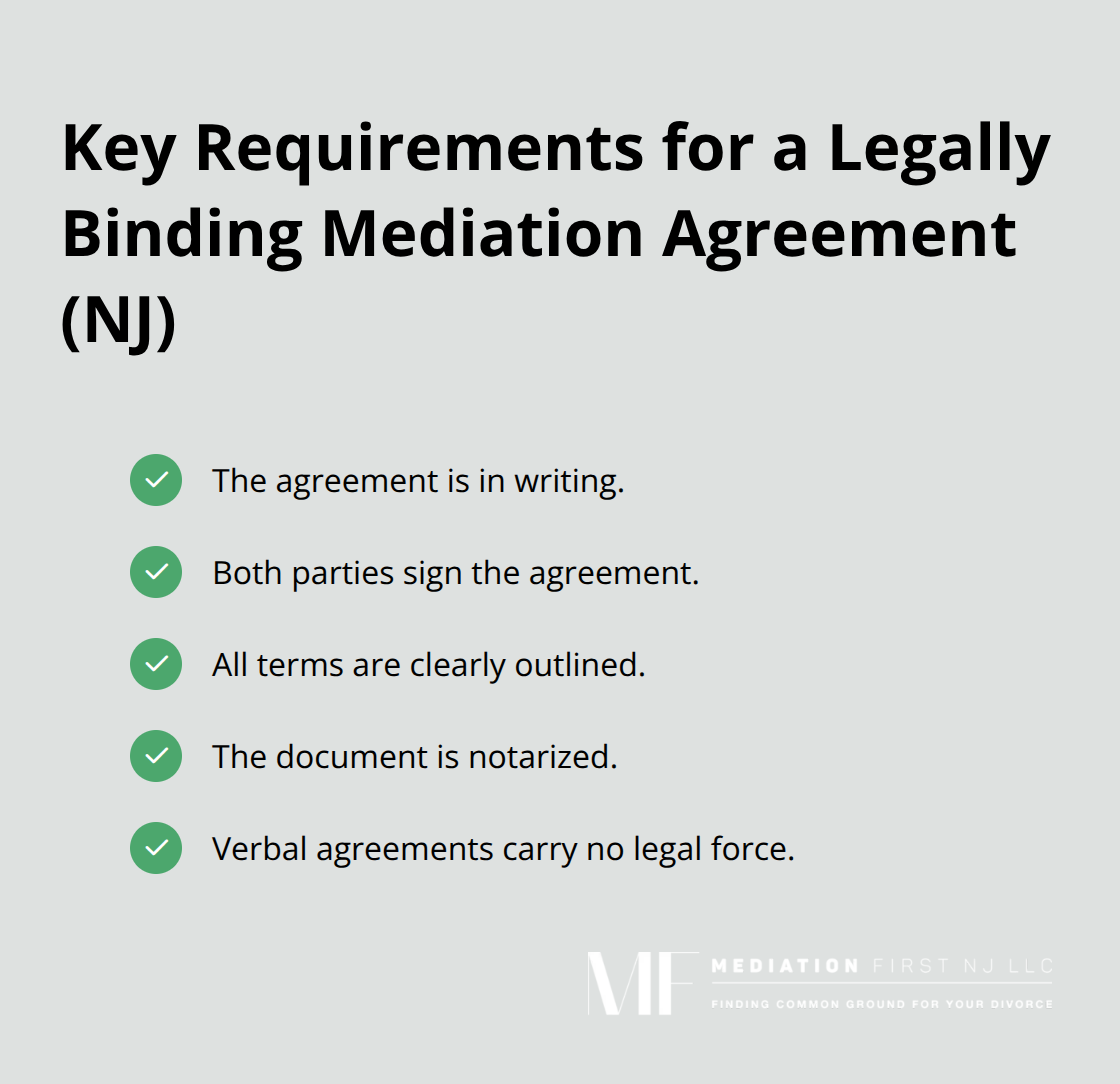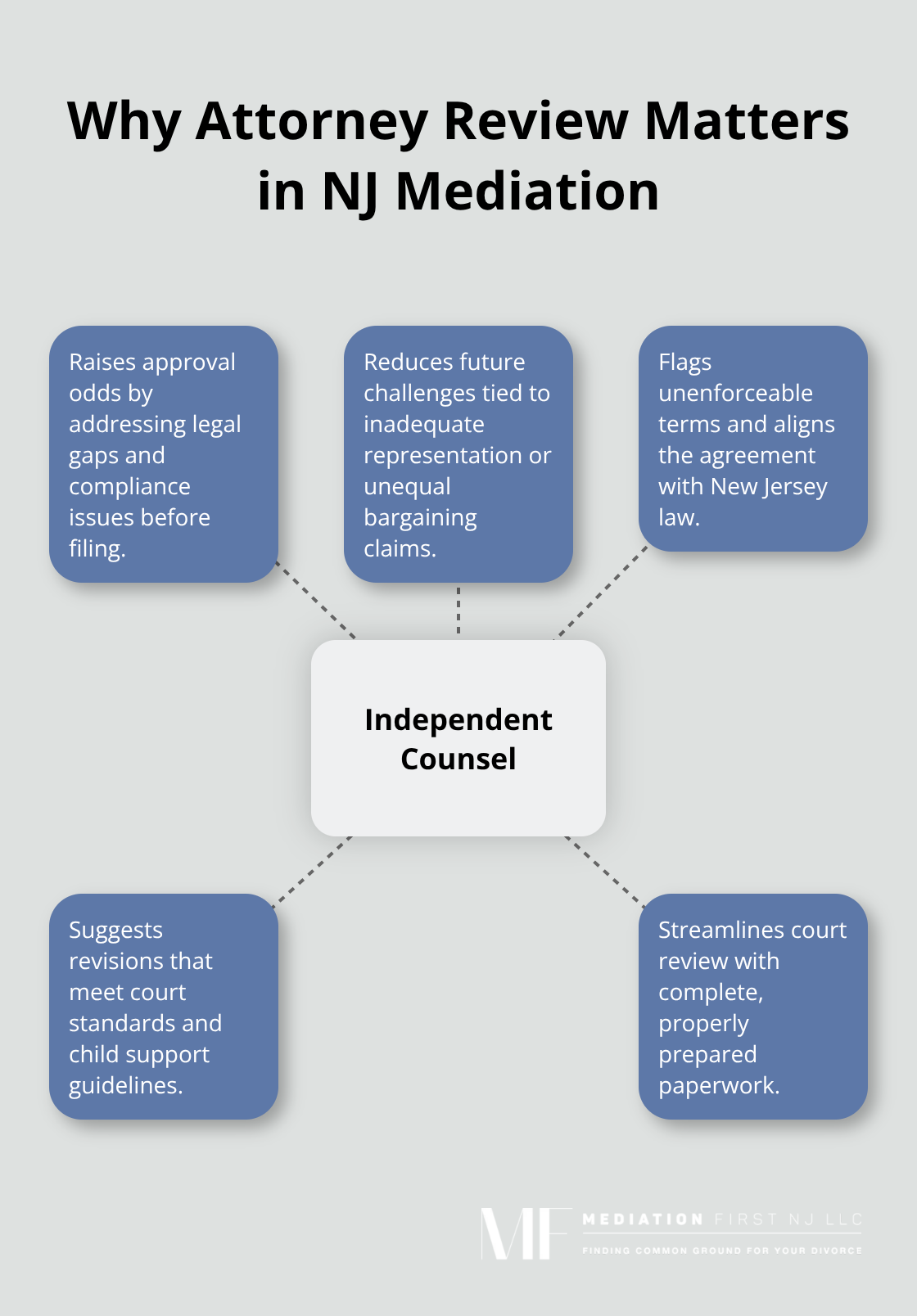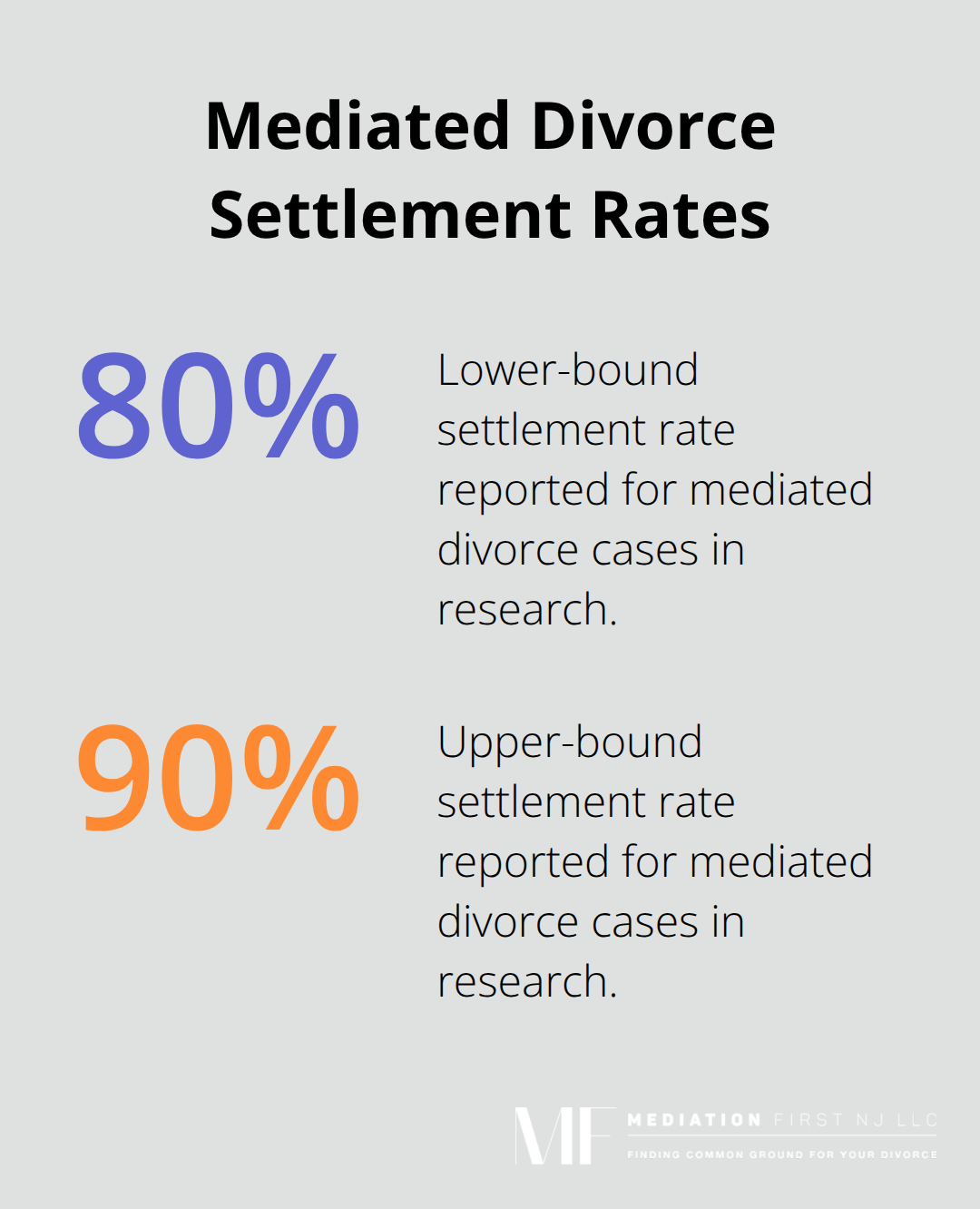Many couples wonder: is divorce mediation legally binding? The answer depends on how the agreement gets finalized through proper legal channels.
At Mediation First NJ LLC, we see clients who need clarity about when their mediated settlements become enforceable. Understanding the legal requirements can save you time and prevent future disputes.
What Makes Mediation Agreements Legally Binding
Written Documentation Requirements
A mediation agreement becomes legally binding only when specific conditions are met. The agreement must be in writing and both parties must sign it to hold legal weight. Verbal agreements reached during mediation sessions carry no legal force and courts cannot enforce them.
New Jersey courts require written documentation that clearly outlines all terms, including property division, custody arrangements, and support obligations. The document must also be notarized to meet legal standards for enforceability. Courts reject agreements that lack proper written format or signatures.

Court Approval Process
Mediation agreements differ significantly from court orders in their enforcement power. While court orders carry immediate legal authority, mediated settlements require judicial approval to become enforceable. Courts review these agreements to verify they comply with state laws and protect the interests of any children involved.
According to the American Bar Association, mediation is the best hope for many clients to maintain some level of control over the settlement, but these only gain legal force after court incorporation. Child support provisions cannot be waived in mediation agreements since support represents the child’s legal right, not a parental negotiation point.
Elements That Create Enforceability
Valid mediation agreements require mutual consent without coercion or pressure from either party. Both spouses must have adequate time to review terms and seek independent legal counsel before they sign. The agreement must comply with state property division laws and support guidelines to withstand court scrutiny.
New Jersey courts treat properly executed mediation agreements as enforceable contracts once parties sign them and courts approve them. Courts will reject agreements that contradict public policy or contain unconscionable terms that heavily favor one party over another.
Common Enforcement Challenges
Courts may invalidate agreements when parties demonstrate fraud, misrepresentation, or duress during negotiations. Mental incapacity at the time of agreement also provides grounds for challenge. Some agreements fail because they violate state laws (such as attempting to eliminate mandatory child support obligations).
The legal process that transforms your mediated agreement into an enforceable court order involves several specific steps and requirements.
How Courts Transform Mediation Agreements Into Legal Orders
Court Filing and Review Process
New Jersey courts require specific documentation before they approve mediation agreements. You must file a Marital Settlement Agreement along with your divorce petition or motion to incorporate the mediated terms. The court reviews every provision to verify compliance with state laws, particularly child support calculations based on the Child Support Guidelines and equitable distribution standards.
Judges examine whether both parties had adequate legal representation or knowingly waived their right to counsel. Courts reject agreements that appear one-sided or fail to meet minimum support requirements. The New Jersey Child Support Guidelines aim to provide fair child support and ensure both parents’ income is shared (regardless of what parties initially agree upon during sessions).
Attorney Involvement Requirements
Separate attorneys who review your mediation agreement before court submission significantly increase approval odds. New Jersey courts prefer when each spouse has independent legal counsel to prevent future challenges based on inadequate representation claims. Attorneys identify potential legal issues that could invalidate the agreement and suggest modifications to meet court standards.

Self-represented parties face higher rejection rates because they often miss technical requirements or include unenforceable provisions. Courts may require additional hearings when parties lack legal representation (which extends the timeline from mediation completion to final approval). Experienced family law attorneys can streamline this process when they prepare proper documentation from the start.
Implementation Timeline and Deadlines
The transformation from signed mediation agreement to enforceable court order varies in New Jersey, depending on court schedules and case complexity. Many divorce cases can be finalized simply with the first two steps of the 7-step divorce process, while courts with heavy caseloads may require longer review periods.
Once approved, your mediation agreement becomes part of the final divorce decree with full enforcement power. Violation of these terms can result in contempt of court charges, wage garnishments, or asset seizure. The court-approved agreement supersedes the original mediated settlement and gives you legal remedies unavailable during the mediation phase.
However, certain circumstances can still challenge even properly executed and court-approved mediation agreements (which makes understanding potential vulnerabilities important for long-term protection).
Can Mediation Agreements Be Overturned
Fraud and Misrepresentation Claims
Courts overturn mediation agreements when one party conceals assets or provides false financial information during negotiations. New Jersey courts see this regularly when spouses hide bank accounts, undervalue businesses, or fail to disclose debts. Financial deception occurs in contested divorce cases, which makes thorough disclosure essential for agreement validity.
Hidden income streams, offshore accounts, or deliberately reduced earnings to lower support obligations provide grounds for invalidation. Courts also reject agreements when parties lie about their ability to pay support or misrepresent property values. Documentation proves essential here – bank statements, tax returns, and business records from the past three years help prevent successful fraud claims later.
Coercion and Duress Situations
Agreements that parties sign under pressure or threats face immediate court rejection. Emotional manipulation, financial threats, or rushed signing without adequate review time invalidate mediation settlements. New Jersey courts examine the circumstances that surround agreement execution and look for signs of unequal bargaining power or intimidation tactics.
Physical abuse history, control over finances, or isolation from legal counsel creates coercive environments that courts recognize. Mental health issues, substance abuse problems, or cognitive impairments at the time of signing also provide challenge grounds. Courts require both parties to demonstrate they understood the agreement terms and signed voluntarily without external pressure.
Protection Through Proper Documentation
Independent legal review before parties sign provides the strongest protection against future challenges. Each spouse should consult separate attorneys who can identify potential problems and recommend modifications. Courts view attorney involvement as evidence of informed consent which makes successful challenges much harder to prove.
Detailed financial disclosures, appraisals for significant assets, and written acknowledgment of voluntary participation create strong defensive documentation. Video recordings of signing sessions, witness statements, and medical clearances for mental capacity further strengthen agreement validity. These protective measures cost more upfront but prevent expensive litigation challenges that can cost tens of thousands in legal fees and court time.
Final Thoughts
Is divorce mediation legally binding? Yes, when parties execute agreements properly and courts approve them. Mediation agreements transform into enforceable contracts once both spouses sign written documentation and courts review the terms for legal compliance. This process requires careful attention to documentation, independent legal counsel, and adherence to state requirements.
Properly executed mediation agreements offer significant advantages over traditional litigation. Research shows 80-90% of mediated divorce cases reach settlement, with higher satisfaction rates than court-imposed decisions. Couples save thousands in legal fees while they maintain control over their family’s future arrangements (and avoid the stress of prolonged court battles).

The key lies in following proper procedures from start to finish. Written agreements, notarization, full financial disclosure, and court approval create legally binding settlements that protect both parties. We at Mediation First NJ LLC guide New Jersey families through this process and help couples reach amicable agreements that serve their family’s best interests.

